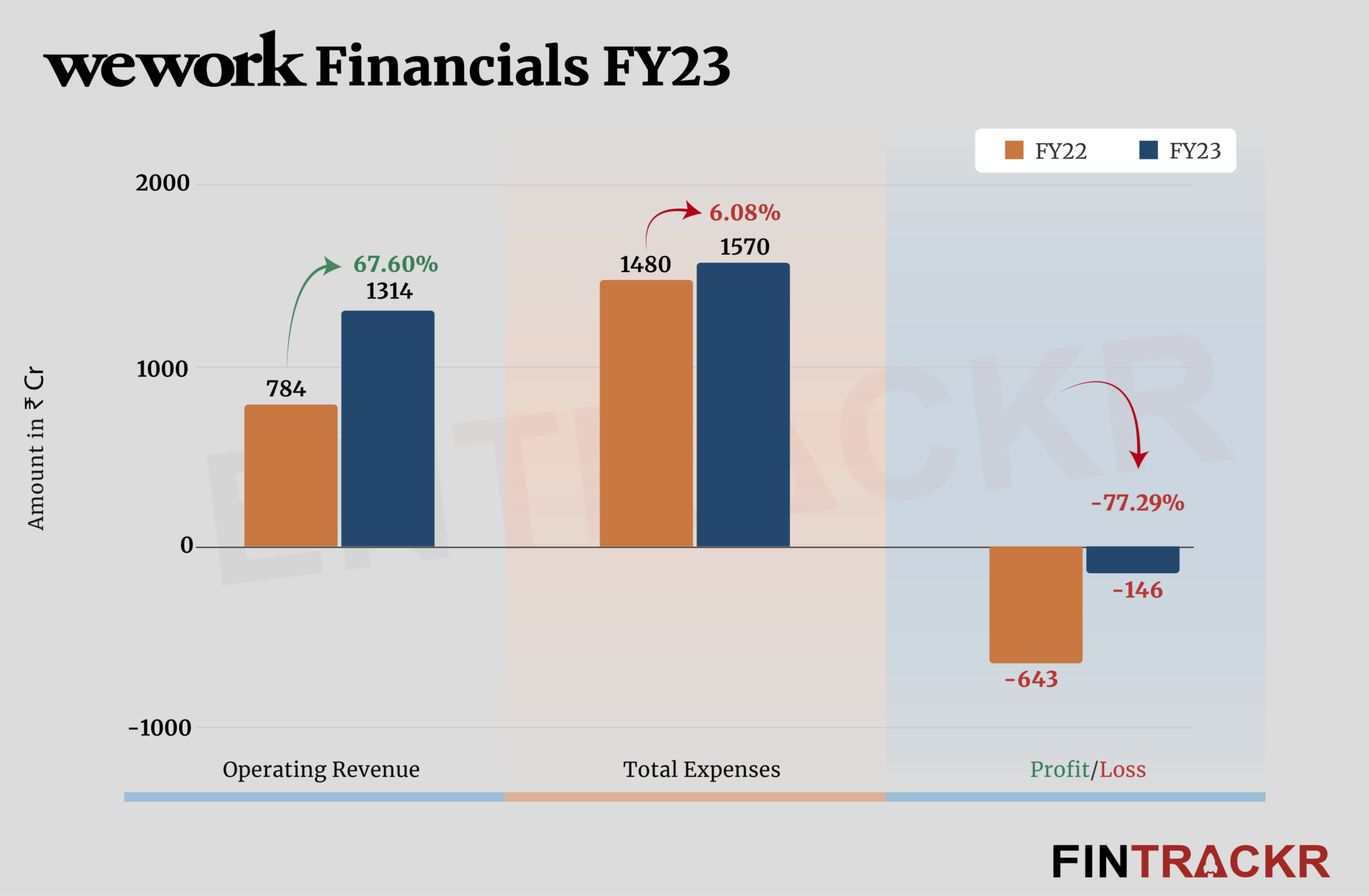[ad_1]
WeWork India has remained islanded from the turmoil at its US counterpoint, which filed for bankruptcy recently. WeWork India’s scale grew to over Rs 1,300 crore in the fiscal year ending March 2023. Significantly, it also narrowed down losses by 77% in the same period.
WeWork India is operated by Bengaluru-based real-estate firm Embassy Group, which holds over 70% stake in the Indian avatar of the co-working firm. Embassy also holds the rights to use the WeWork brand name in India.
WeWork India’s revenue from operations surged by 67.6% to Rs 1,314 crore in FY23 from Rs 784 crore in FY22, its consolidated financial statements filed with the Registrar of Companies show.
Income from leasing office spaces was the primary source of revenue for WeWork accounting for 72% of the total revenue, which increased by 47.6% to Rs 942 crore in FY23. The rest of the income came from services fees and other allied services.
See TheKredible for the detailed revenue breakup.
WeWork India’s chief revenue officer Clifford Lobo told Entrackr that in the past year the firm has seen steady demand for its flexible workspace solutions.
Moving over to the cost side, its depreciation and interest expense formed 67% of the overall cost and cumulatively stood at Rs 1,050 crore in FY23. Notably, a significant portion of this amount, Rs 883 crore was associated with leasing costs which the company spread year-on-year in the form of interest leasing and assets utilization.
WeWork India’s employee benefits, rent, repair, information technology, management, advertising, and other overheads took its total expenditure up by 6% to Rs 1,570 crore in FY23.
Check TheKredible for the complete expense breakup.

- Employee benefit
- Power and fuel
- Rent and repairs
- Information technology
- Advertising promotional
- Common area maintenance charges
- Interest on lease and borrowing
- Depreciation and amortisation
- Others


The impressive scale and controlled expenditure helped WeWork to reduce its losses by 77.3% to Rs 146 crore in FY23 from 643 crore in FY22. Its ROCE and EBITDA margin improved to -41% and 1.4% respectively. On a unit level, it spent Rs 1.19 to earn a rupee in FY23.
“…Improving risk management and portfolio strategies has played a crucial role in boosting our margins in the last fiscal,” Lobo explained when asked about the factors driving the better bottom line during FY23.
Demand for coworking space is gradually increasing in India, with studies projecting the market to be worth nearly $3 billion by 2029 at a CAGR of 7%. Besides WeWork, several companies such as 91 Springboard, Awfis, and Mumbai Coworking are looking to tap into this segment.
| EBITDA Margin | -46% | 1.4% |
| Expense/Rupee of ops revenue | ₹1.89 | ₹1.19 |
| ROCE | -232% | -41% |


Among the notable competition, Awfis has been among the frontrunners in the domain. Its revenue from operations surged 2.1X to Rs 545 crore during the fiscal year ending March 2023 as compared to Rs 257 crore in FY22. However, the losses of the firm declined by 18.67% to Rs 46.6 crore in FY23. It also shared quarterly results for April-June 24, wherein the revenue stood at Rs 187.7 crore while losses stood at Rs 8.3 crore. Moreover, Awfis has filed its draft red herring prospectus (DRHP) with the Security Exchange Board of India (SEBI) for an initial public offering (IPO).
At almost $115 million, WeWork India is comfortably the leader of the pack in the segment, and seems well on its way to breakeven. In this case, the parent firm could have learnt a lesson or two from the Indian subsidiary, on cost controls and operations. Having an established real estate player in the commercial segment as partner has helped no doubt as the Embassy group has proven. Going ahead, the firm’s challenge remains controlling significant escalations in rentals for its customers, as the market remains competitive. While WeWork has an advantage with its premium position in most segments, it does face a real challenge from existing as well as upcoming firms. Real estate by its very nature is regional, and the co-working space has also thrown up many competent firms that are strong in just a single city, for instance. To that extent, sharpening the brand’s edge remains key for the future in many ways.
[ad_2]
Source link




